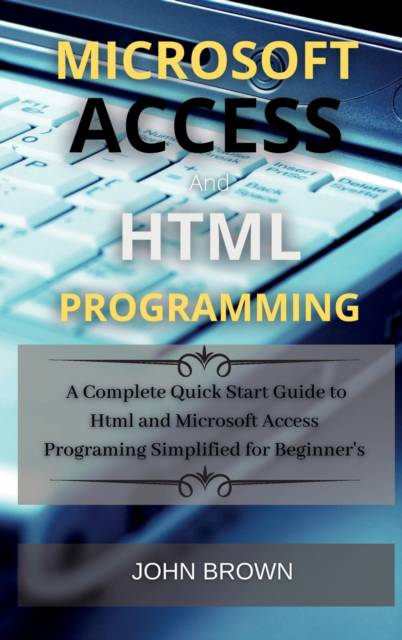
- Afhalen na 1 uur in een winkel met voorraad
- Gratis thuislevering in België vanaf € 30
- Ruim aanbod met 7 miljoen producten
- Afhalen na 1 uur in een winkel met voorraad
- Gratis thuislevering in België vanaf € 30
- Ruim aanbod met 7 miljoen producten
Microsoft Access and HTML Programming
A complete Quick start guide to Html and Microsoft Access 2021 Programming Simplified for Beginner's
John BrownOmschrijving
Your customers will never stop reading this guide !!!
Microsoft Access
Microsoft Access unlike SQL, Oracle databases stores the data in its own format in accordance with the Access Jet Database Engine.
Via Microsoft Access you can easily import data from Excel spreadsheets, Word documents.
Microsoft Access can easily work with popular and heavy databases like oracle and SQL, DB2. You can link the data and can import the data stored in other applications and their databases. Microsoft Access can understand other formats of data including database file structures.
For the analysts who faces ever increasing pool of data Microsoft is very beneficial for them. Microsoft is a major hit with larger and wider datasets because it has no predetermined row limitations.
Microsoft Access manages data effectively in the different data tables.
Moreover, Microsoft Access comes with the tools that helps a lot in building your own distribute applications.
Today world have more data than ever, and data is just increasing and the demand for complex data analysis is more.
So, the surge of data need more power tools to get way from spread sheets mechanism.
Microsoft Access is a powerful tool for managing the data and managed data is very important in order to depict future endeavors. Hence learning Microsoft only help in designing better data for your organizations.
The language HTML has arrived at middle age in standard Version 4.01 and isn't relied upon to change once more. Or maybe, HTML is being subsumed and modularized as a component of Extensible Markup Language (XML). Its new name is XHTML, Extensible Hypertext Markup Language.
The rise of XHTML is simply one more section in the frequently wild history of HTML and the World Wide Web, where disarray for creators is the standard, not the exemption. At the most noticeably awful point, the older folks of the World Wide Web Consortium (W3C) answerable for acknowledged and adequate employments of the language - i.e., principles - lost control of the language in the program "battles" between Netscape Communications and Microsoft. The failed HTML+ standard failed right from the start, and HTML 3.0 turned out to be so impeded in banter that the W3C essentially racked the whole draft standard. HTML 3.0 never occurred, notwithstanding what some crafty advertisers asserted in their writing. All things being equal, by late 1996, the program makers persuaded the W3C to deliver HTML standard Version 3.2, which in every way that really matters, just normalized the greater part of the main program's (Netscape's) HTML augmentations.
Specificaties
Betrokkenen
- Auteur(s):
- Uitgeverij:
Inhoud
- Aantal bladzijden:
- 188
- Taal:
- Engels
- Reeks:
- Reeksnummer:
- nr. 1
Eigenschappen
- Productcode (EAN):
- 9781802262995
- Verschijningsdatum:
- 17/04/2021
- Uitvoering:
- Hardcover
- Formaat:
- Genaaid
- Afmetingen:
- 152 mm x 229 mm
- Gewicht:
- 421 g

Alleen bij Standaard Boekhandel
Beoordelingen
We publiceren alleen reviews die voldoen aan de voorwaarden voor reviews. Bekijk onze voorwaarden voor reviews.











